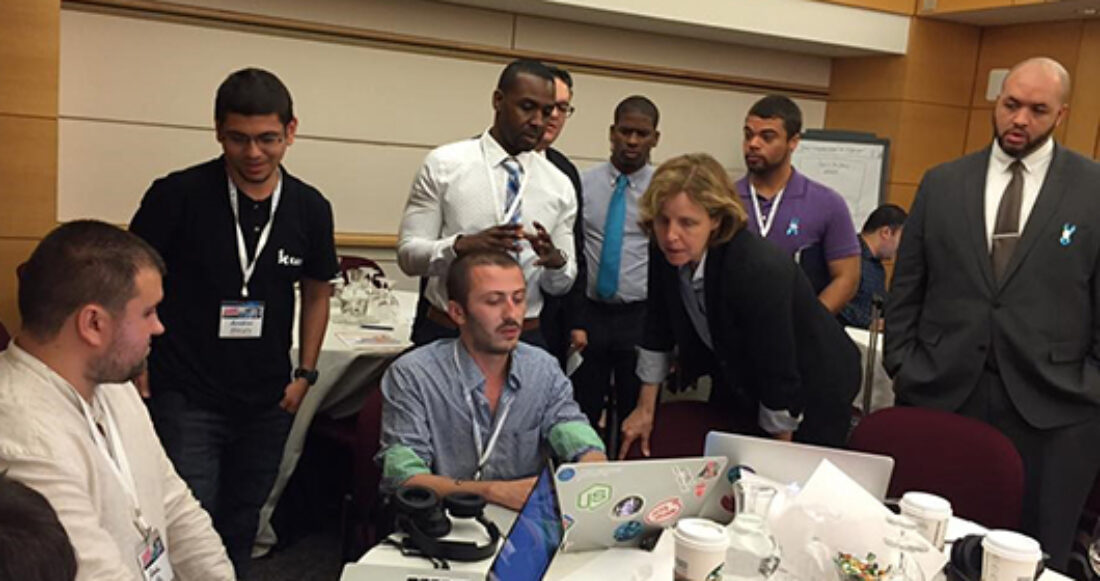Child Welfare “Hackathon” Yields Ideas, Collaboration and Momentum

During the 24-hour White House Foster Care and Technology Hackathon, a diverse mix of technology leaders, child welfare experts and concerned citizens generated solutions for some of foster care’s most pressing issues, including homelessness, teen pregnancy and a lack of foster families.
“We hope the hackathon is the beginning of a national movement to bring together technologists, philanthropists, legal experts, stakeholders and system leaders to create a much-needed shift in the conversation about using technology to contribute to the well-being of children and families,” says Eric Miley, a program associate with the Casey Foundation who helped lead the two-day event.
Early commitments to the effort include:
- A $1 million fund from the U.S. Administration for Children, Youth and Families to help agencies update data systems, matched by a $1 million Technology Innovation Fund from the Pritzker Foster Care Initiative to boost efforts to use technology on behalf of youth in foster care ages 18–24;
- An effort, launched by the Walter S. Johnson Foundation and Foster Care Counts, to provide laptops to California youths ages 16–20 to encourage them to stay in school; and
- A plan, announced by cloud-computing heavyweight Salesforce.com, to prototype a modern case management system for foster care agencies.
The hackathon, held May 26–27, brought together more than 150 participants to focus on solving problems by collaborating on the design and development of software prototypes.
Hackathons — used in the corporate world — involve teams of software engineers, data scientists, designers and subject-matter experts working together on specific problems.
“Businesses have often use hackathons to encourage creativity and to generate product breakthroughs,” Miley says. “Increasingly, hackathons are being used in the philanthropic and social sectors to leverage digital technologies and improve how public systems deliver services — even to rethink how systems, governments and philanthropies conceive of their work.”
The White House hackathon involved teams from dozens of technology firms including Microsoft and Stack Overflow; the Presidential Innovation Fellows; open-source guru Scott Hanselman; U.S. Chief Data Scientist D.J. Patil; U.S. Chief Technology Officer Megan Smith, former vice president at Google; and Rafael López, commissioner of the U.S. Administration on Children, Youth and Families. A team of developers from Kalon Global Group even traveled from Romania to lend a hand.
Hackers focused on several challenges, including:
- Helping infants and children born to mothers with substance abuse issues by streamlining the process by which mothers can access the resources they need to overcome addiction;
- Facilitating foster parent recruitment efforts and helping prospective foster parents assess their readiness for fostering;
- Enhancing platforms to help young people define goals and access employment, education and housing services and opportunities;
- Developing a tool to help identify technology products for child welfare systems and connect systems with innovative ideas to technologists who can help with development;
- Enabling iFoster to allow young people access to essential documents, such as social security records; and
- Providing in digital form information about sexual health, including pregnancy planning and prevention.
“President Obama believes that with enhanced commitment and coordination, the technology and child welfare sectors can work together to solve some of our most pressing issues,” according to a White House statement, which cited numerous examples of technology being used to help young people in foster care.
Sixto Cancel, who grew up in foster care and is the founder of ThinkOfUs — a startup voicing the needs of young people — implored fellow hackers to adopt a sense of urgency to advance reforms.
“Be unapologetic,” Cancel said. “Your primary mission is to serve our own brothers and sisters who have been in foster care.”
To get involved with similar hackathons planned for New York City, Silicon Valley and elsewhere, contact Eric Miley.






